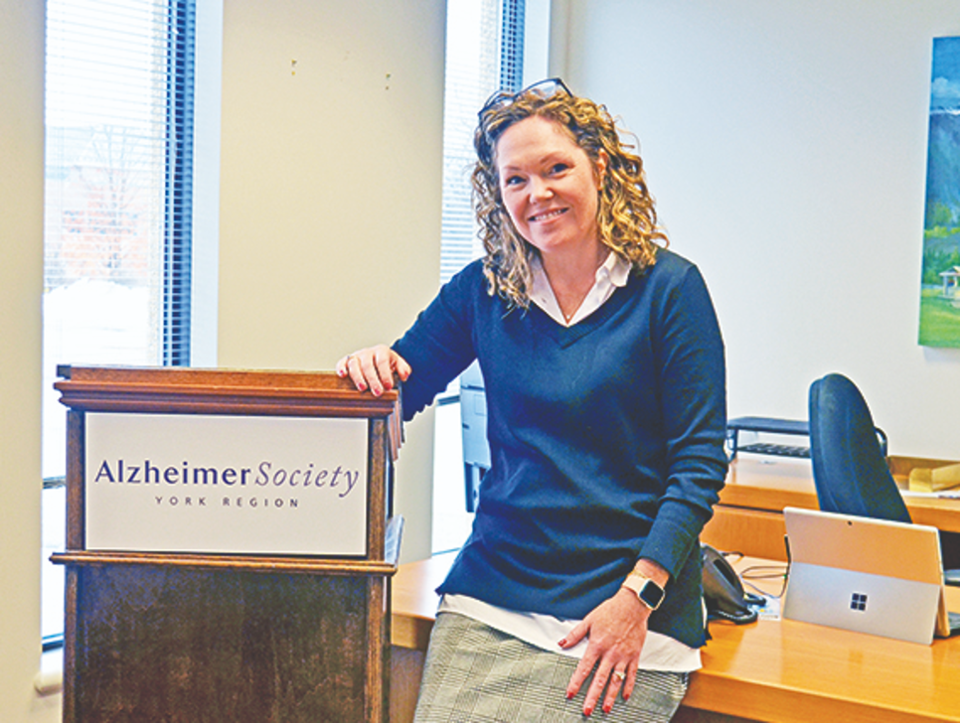Communities can be difficult to navigate if you’re living with, or a caregiver of, someone living with dementia. But the Alzheimer Society of York Region is aiming to increase education and outreach programs to foster “dementia-friendly communities.”
The global pandemic illustrated just how isolating dementia can be for both the individual and their caregiver, says Kari Quinn-Humphrey, president and CEO of the Alzheimer Society of York Region, and “making sure we’re providing opportunities for people to still be socially engaged and out there and part of the community.”
“We need to make sure we’re ready for the changing needs of this community, which is growing up so fast,” says Quinn-Humphrey. “We’re going to see a lot of growth in York Region and we have a large senior population. We need to be ready for that influx of individuals who want to be in their homes for as long as possible – and for us to be able to have those supports in place to meet those needs.”
For the last several years, the work of the Alzheimer Society of York Region has focused on day programs and social work. New funds, however, have come into their coffers to fund an additional educator who will be essential in helping the society meet their “dementia-friendly community” goals that will be enshrined in their new strategic plan set to launch next month.
“In the eight months I have been here, we have now freed up some designated funds to hire a second educator and the next step in the work up here in York Region from an education perspective is to start building that program for dementia-friendly communities,” says Quinn-Humphrey. “In York Region, we’ve had two big buckets – our day programs and our social work team. We have many other smaller programs but the next iteration of the programs through our strategic plan we’re working on right now, one of the big buckets will be empowering our community to be more supportive of persons living with dementia. Going out and educating small businesses on the basic interactions of someone living with dementia and their caregivers to allow our clients to be out in the community and go into small businesses that have some understanding of dementia will be the next game-changer.
“Dementia-friendly communities is educating staff within an organization so the goal is to have 75 per cent of the staff in an office or in a retail space, a bank, a grocery store, to have some basic understanding of dementia and understand how the environment affects a person living with dementia and their caregiver. It’s twofold – that caregiver will feel more comfortable to be out there in the community and to remain engaged with the community and feel they are in a safe space to have that person living with dementia to also be going out into the community. It is quite exciting. It is something we have seen in other chapters across Ontario and Canada and it is something I would like to grow up here in York Region.”
Quinn-Humphrey came to the Alzheimer Society of York Region after a term as interim CEO of the Alzheimer Society of Toronto.
As a student, she says she always wanted to work with people and that drive was only strengthened when she began working with seniors.
“I found seniors were lovely to work with, always generally very gracious and always gave you good insights and wanted to take you under their wing,” she explains. “They were very appreciative of your time and what you brought into the relationship.”
Working first in long-term care, coming home after putting a smile on someone’s face was reward enough – “If you can improve that life in any regard on a day-to-day basis, I found that very valuable.”
Moving from a general long-term care career to one with a more specialized focus on memory care was something of a natural progression for Quinn-Humphrey who has warm memories of her Aunt Marge, who lived with dementia.
“From a very young age, my mother taught me to have supportive communication style with a person with memory loss,” she says. “My Aunt Marge would repeat herself, ask me my name over and over, and my mom taught me very young to just answer the question over and over, listen to the story over, and over…”
These early experiences helped reinforce the importance of learning communication-techniques and making person-centred decisions. While she might not have as much of a hands-on role in her capacity as CEO, moving into an education role has a huge impact on direct frontline support.
Next month’s launch of the Alzheimer Society of York’s strategic plan will serve as a blueprint for the next four years and is guided by the principles of fund development, education, and active living.
“In order to grow and in order to meet the needs in the community, which is also growing, we need to keep up with that and our fundraising arm of the organization is key to that,” says Quinn-Humphrey, adding 100 Women Who Care Central York Region supported their Active Living Program last fall.
The Active Living program will include drumming circles, art therapy programs, yoga, tai-chi, and more – “but also contracting other experts to do training or programming with our clients out in the community so we’re going out to them instead of them coming to us.”
“It also helps to engage them in the community, which is something we really want to focus on over the next few years, making sure people are not isolated,” she says. “COVID has shown us just how isolating dementia can be and being a senior… being a senior and then adding on dementia can become very isolating and we want to make sure we’re providing opportunities for people to still be socially engaged and out there and a part of the community.”
Brock Weir is a federally funded Local Journalism Initiative reporter at The Auroran
